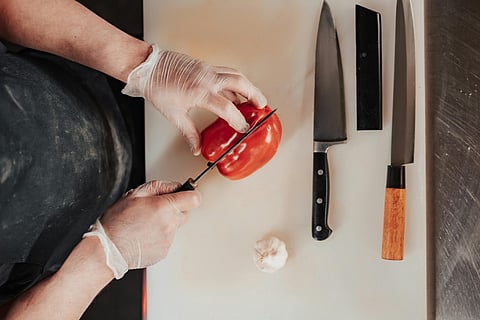How to Clean and Maintain Your Kitchen Knives for Longevity
Knives are essential tools in any kitchen, playing a crucial role in food preparation. However, not many people know how important it is to look after them.
Proper care and maintenance not only enhance their performance but also extend their lifespan. Not to mention it can greatly improve cooking efficiency and productivity.
In this article, we are going to discuss some helpful tips to clean and maintain your kitchen knives so that you can save both time and money.
Sharpening
Keeping your knives sharp is essential for their longevity and performance. A dull knife requires more force to cut through food, increasing the risk of accidents and injuries.
Regularly using a quality Knife Sharpener will ensure they remain effective and safe to use. From whetstones to honing rods and electric sharpeners, there are different options to choose. Sharp Pebble has a great selection available if you're unsure where to begin.
Cleaning
After cooking with your knives, it’s important that you clean them immediately after. Food particles and moisture can lead to rust and corrosion if left on the blade for extended periods of time.
To clean effectively, hand wash them with warm, soapy water - avoiding abrasive cleaners or steel wool that could scratch the blade's surface. After washing, rinse thoroughly and pat dry with a clean towel so that no moisture remains behind.
Storage
How you store your knives is just as important as how you clean them. Storing improperly can lead to dulling, chipping, and again - accidents and injuries. A few recommended storage options include:
Knife Block – A wooden or acrylic block is a good option for most households.
Magnetic Strip – A stylish and practical way to store knives and prevent them from rubbing together.
Knife Sheaths – Perfect for those who prefer to store utensils in a drawer.
What you choose will depend on your own personal preferences.
Inspecting
Another vital step is to regularly inspect your knives for any signs of damage, such as chips, cracks, or loose handles. Addressing these issues promptly can prevent further damage and ensure safe usage.
If you notice any significant damage, consider having the blade repaired by a professional or replacing it if necessary. It won't take long but can save you a lot of money later down the track.
Handle Care
Lastly, the handle of your knife should also be given adequate attention. Depending on the material, your handle type may require unique care.
For instance, wooden handles should be oiled periodically to prevent drying out, while plastic handles can be cleaned with regular soap and water. Just avoid soaking for long periods, as this can damage both the blade and the handle.
Final Words
Taking the time to clean and maintain your knives is essential for ensuring their longevity and performance in the kitchen. By following the steps above, you can keep them in excellent condition for as long as possible.
Remember a well-maintained blade won’t just enhance the cooking experience but also contributes to efficiency and safety!

